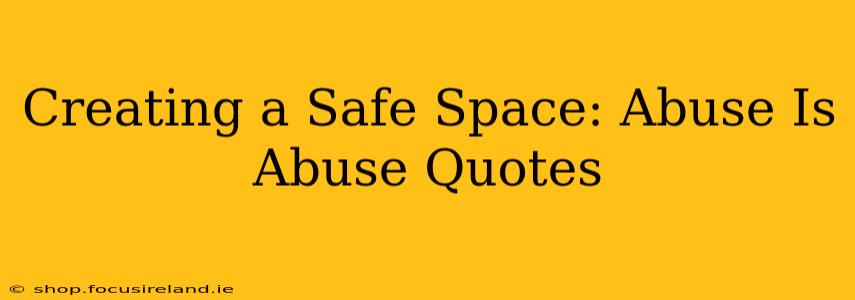Abuse is a pervasive issue, affecting millions globally. Understanding its various forms and recognizing the signs are crucial steps in creating safe spaces and fostering healthier relationships. This article delves into the crucial message "abuse is abuse," exploring its nuances and providing resources for support. We'll examine different types of abuse, common misconceptions, and the importance of believing survivors.
What Constitutes Abuse?
Abuse isn't limited to physical violence; it encompasses a spectrum of controlling behaviors designed to exert power and dominance over another person. This includes:
-
Physical Abuse: Any intentional act causing physical harm, from hitting and slapping to more severe forms of violence. Bruises, injuries, and fear of physical harm are all indicators.
-
Emotional Abuse: This insidious form of abuse involves verbal attacks, intimidation, manipulation, threats, constant criticism, and humiliation. It aims to erode a person's self-worth and control their emotions.
-
Verbal Abuse: Similar to emotional abuse, verbal abuse uses hurtful words, insults, name-calling, and constant belittling to degrade and control. The goal is to undermine a person's confidence and self-esteem.
-
Financial Abuse: Controlling access to money, limiting financial independence, forcing someone into debt, or stealing their money are all forms of financial abuse. This can leave victims feeling trapped and powerless.
-
Sexual Abuse: Any unwanted sexual contact, including rape, sexual assault, or any form of non-consensual sexual activity. This includes coercion, threats, and manipulation to engage in sexual acts.
-
Digital Abuse: This increasingly prevalent form involves harassment, stalking, threats, or humiliation through online platforms like social media, email, or text messages. This can include sharing private information without consent.
Why the Phrase "Abuse is Abuse"?
The phrase "abuse is abuse" is a powerful statement challenging the normalization and minimization of different forms of abuse. It emphasizes that:
-
No form of abuse is insignificant: All types of abuse are harmful and cause significant emotional, psychological, and sometimes physical damage. Minimizing one form because it's not physical violence invalidates the survivor's experience.
-
All forms are interconnected: Different types of abuse often co-occur. For example, emotional abuse can create a climate of fear that makes physical abuse more likely or acceptable.
-
It's crucial to listen and believe survivors: Survivors may downplay their experiences, internalize blame, or fear not being believed. The statement "abuse is abuse" empowers survivors to acknowledge their experiences without minimizing their suffering.
What are the Signs of Abuse?
Recognizing the signs of abuse is crucial for both victims and those around them. These signs can vary, but common indicators include:
- Unexplained injuries: Bruises, cuts, or other injuries that the person can't or won't explain.
- Changes in behavior: Withdrawing from friends and family, becoming overly anxious or fearful, or exhibiting sudden changes in personality.
- Controlling behavior: A partner or family member making all the decisions, monitoring their whereabouts, or limiting their contact with others.
- Low self-esteem: Constant self-criticism, feeling worthless, or believing they deserve the abuse.
- Fear of conflict: Avoiding discussions or arguments, or reacting with excessive fear to disagreements.
What if I think someone I know is being abused?
If you suspect someone you know is experiencing abuse:
- Listen without judgment: Create a safe space for them to share their experiences without feeling pressured or judged.
- Validate their feelings: Let them know you believe them and that their feelings are valid.
- Offer support: Let them know you're there for them and offer practical help, such as assisting with transportation or finding resources.
- Encourage them to seek help: Provide information about resources like helplines, shelters, and support groups.
- Don't pressure them: Respect their decision on whether or not to report the abuse.
Where can I find help?
Numerous resources are available for victims of abuse and those who want to learn more:
(Note: I cannot provide specific links to websites or organizations due to the limitations of my programming. Please use online search engines to find appropriate resources in your region.) Search for terms such as "domestic violence hotline," "sexual assault support," or "abuse support services" along with your location. Many national and local organizations offer confidential support, counseling, and legal assistance.
Remember, abuse is abuse, regardless of its form. Creating safe spaces requires understanding, empathy, and a commitment to supporting survivors.

